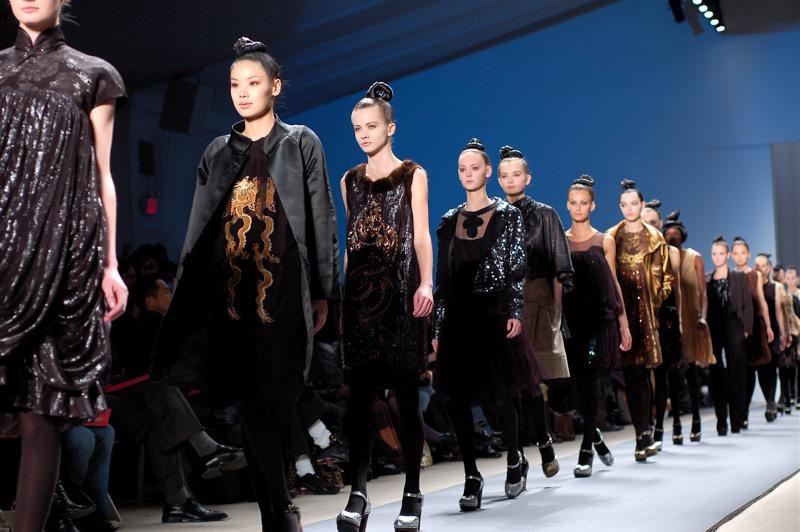The “price of thin” usually refers to the effort put into counting calories, hitting the gym or taking more drastic measures to reach a certain weight. But in France, the fashion capital of the world, the government has quite literally assigned a price to excessive thinness.
The French legislature passed a bill Friday that bans those with a Body Mass Index under 18 from modeling in any capacity in the country. BMI is calculated using only a person’s height and weight, and a BMI of 18 is considered to be the borderline between “under weight” and “healthy weight.” This new law makes France the fourth country to pass such a measure, along with Italy, Spain and Israel. Fashion agencies discovered using models below this BMI — an indication of medical malnutrition — will be charged an $85,000 fine and could face jail time.
Along with the model ban, France also passed a bill to outlaw pro-anorexia websites, commonly known as “thinspiration” blogs. These combined legislations represent France’s dedication to eradicating the tradition of eating disorders that has notoriously plagued the fashion industry for years.
“This is an important message to young women, young women who see these models as an aesthetic ideal,” Health Minister Marisol Touraine told France 24. “It’s important for fashion models to say that they need to eat well and take care of their health.”
Most people can agree that eating disorders of any kind should not be an industry norm. In a world with as many as 24 million men and women suffering from eating disorders, having models who are clearly ill strutting up and down a runway is not OK. Furthermore, putting intense pressure on girls as young as 16 years old to reach a certain level of thinness just to get a job is commonplace in an industry that relies on human mannequins to sell clothes.
“I would go to some jobs and they’d tell me to move the way I was holding my arm because it looked too fit and muscular,” model Aline Fernandes told Cosmopolitan Magazine on March 20. “There was a lot of pressure on me to be thin when I was doing fashion … Having the law in France would be wonderful. The whole world is going in that direction. It’s beautiful to see that the new standard of beauty is one of health. We’re all human. We’re not hangers.”
But BMI is not an accurate measure of a person’s physical health, let alone an indicator of disordered eating. The number is merely a calculation based on a person’s height and weight. It does not measure muscle mass. It does not measure body fat percentage. And it certainly does not measure the symptoms indicating an eating disorder. It’s a number, and one number cannot supply a full picture of health.
“When you look at the criteria behind anorexia, you can’t look only at the body mass index when other criteria are also involved: psychological, a history of hair loss, dental problems,” Isabelle Saint-Felix, the head of France’s National Union of Modeling Agencies, told Agence France-Presse. “It’s important that the models are healthy, but it’s a little simplistic to think there won’t be any more anorexics if we get rid of very thin models.”
Bodies come in all shapes and sizes. What may be a healthy, natural BMI for one person could easily be unhealthy for another. A person could follow every “law” of nutrition and still be overweight. Or underweight. Either way, BMI can’t show the picture of their eating habits, exercise regimen, genetics or medical conditions. It just shows a calculation of weight in relation to height. And that number isn’t remotely sufficient to determine whether or not a model has an eating disorder.
France’s new law also sends a message that thin bodies are incorrect. While the stigmatization of overweight people is better known, applying that discrimination to underweight people is just as dangerous and demeaning. Body-shaming anyone, whether overweight, underweight or in the middle, is never appropriate. Just as there is no perfect weight for anybody, there is no perfect BMI either.
If France is really concerned about eating disorders in the modeling industry, maybe they should stop setting numerical standards and start caring about the health of individual models. Instead of forcing them to cram hamburgers in their mouths to reach a BMI of 18, enforcing a system where modeling agencies provide routine health and wellness checks for their employees could alleviate the real mental and physical complications that accompany disordered eating.
Just as there is no perfect weight for anybody, there is no perfect BMI either. While France deserves credit for attempting to reduce eating disorders, setting an arbitrary number as a standard for employment not only perpetuates the objectification of models, but also attempts to classify health into a neat, yet totally arbitrary little box. Healthy should be the new skinny, but one simple number cannot determine what healthy is.






















































































































